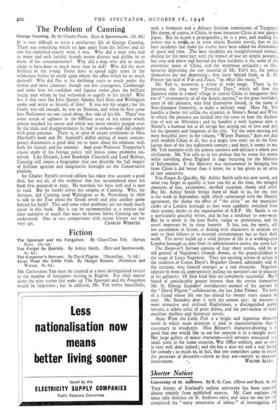The Problem of Canning
George Canning. By Sir Charles Petrie. (Eyre & Spottiswoode. 12s. 6d.)
IT is very difficult to write a satisfactory life of George Canning. There was something which set him apart from his fellows and no one has explained exactly what it was. Why did a man who had so many and such faithful friends arouse distrust and dislike in so many of his contemporaries? Why did a man who did so much claim to have done so much more than he did? Why did the most brilliant of the young Tories have to spend eight years in the wilderness before he could again obtain the office which he so much desired? Why did Pitt in his declining years so much prefer the slower and more cautious, though not less courageous, Castlereagh and make him his confidant and legatee rather than the brilliant young man whom he had welcomed so eagerly to his circle? Why was it that men like John Quincy Adams, Earl Grey and Wellington spoke and wrote so bitterly of him? It was not his origin ; for his family was old enough, he was an Etonian, and when he first came into Parliament no one cared about that side of his life. There was some streak of ugliness in the b?filiant array of his talents which almost wrecked his career and which was never entirely purged even by the trials and disappointments he had to endure—and did endure with great patience. There is, in spite of recent revelations in Miss Marshall's book and Dr. Aspinall's skilful editing of many contem- porary documents, a good deal yet to learn about his relations with both his friends and his enemies. And even Professor Temperley's classic study of his foreign policy still leaves some problems un- solved. Like Disraeli, Lord Randolph Churchill and Lord Balfour, Canning still awaits a biographer that can describe the full impact of brilliant egotism and imaginative foresight on the Conservative phalanx.
Sir Charles Petrie's revised edition has taken into account a good deal, but not all, of the evidence that has accumulated since his book first appeared in 1930. He marshals his facts well and is easy to read. But he hardly solves the enigma of Canning. Why, for instance, did Canning send Wellington to St. Petersburg in 1826 to talk to the Tsar about the Greek revolt and play another game behind his back? This and some other problems are not made much easier in this book. But it can be recommended as a concise and clear narrative of much that must be known before Canning can be understood. One or two comparisons with recent history are not






























 Previous page
Previous page